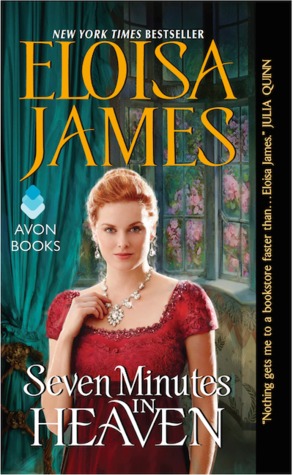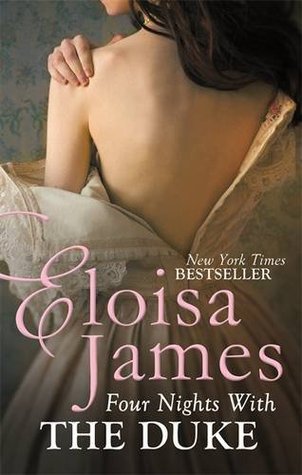 Oh, Eloisa James. You never fail me. Not really. Unlike the last historical romance I read, Lisa Kleypas' Devil in Spring, James' latest, Seven Minutes in Heaven, was an utter delight, even if trying to keep the relations of all the characters straight made my head ache.
Oh, Eloisa James. You never fail me. Not really. Unlike the last historical romance I read, Lisa Kleypas' Devil in Spring, James' latest, Seven Minutes in Heaven, was an utter delight, even if trying to keep the relations of all the characters straight made my head ache.
Seven Minutes is the third in the Desperate Duchesses by the Numbers series, which is a continuation of the Desperate Duchesses series, but with the "next generation" of couples finding love. The hero, Ward Reeve, is the illegitimate son of the hero of the first Desperate Duchesses book, the Earl of Gryffyn. The heroine, Eugenia Snowe, is the widowed daughter of the hero of Duchess by Night, which I think was DD #3. But pretty much all of the couples make an appearance here in one way or another, and the way they're all connected--having read the original books several years ago and even the most recent one around a year ago--gave me a bit of a headache as I tried to keep everyone straight.
The plot is simple. Since her widowing, Eugenia has operated a registry for governesses, sending out the best child-rearers in the country to families in need. Ward is definitely in need. He's recently found himself the guardian of his two younger half-siblings, who are eight and nine years old and have to this point been raised under rather unusual circumstances. Unusual enough that they're little hellions and have driven away not one but two of Eugenia's best governesses in short order. So he decides he wants Eugenia--and it doesn't hurt that he's attracted to her, and that she's decided that maybe moving on from her dead husband to have a little fun would be in her best interests...
As with all of James' books, this is charming. There's a simple misunderstanding at the heart of the book, albeit one that, for most of the time, the two main characters don't really know exists. Yes, a little more communication could have been useful and derailed most of it, but the two protagonists were so concerned with being proper even within the bounds of a rather improper relationship that I can kind of see why they were being so circumspect with each other. Their banter was delightful and witty, as James' banter always is. And while Eugenia is willing to compromise on many things, one thing she is not willing to compromise on is that the man she ends up with must respect her--and while she thinks Ward might love her, she's not sure he respects her, and she's willing to walk away without that respect. For a long time, I was worried that James wasn't going to resolve this, and that Eugenia would compromise on that demand for respect--but she didn't! James resolved it wonderfully, just as she always does.
And another high point here was the children. I don't typically like child characters in books, but James has actually used them to her advantage quite a bit. I don't remember Eugenia and Ward as children from the original DD books, though now I'm tempted to go back and read particularly for them, but Lizzie and Otis, Ward's younger half-siblings here, are wonderful. They add such color to the story, but they're not weird for the sake of being weird. Rather, they're weird because of the way they were brought up prior to their arrival on Ward's doorstep, and they have additional depths that come out as the story unfolds--such as why Lizzie really wears that veil. They're integral to the plot and they're well-rounded characters, which is so rare for children that seeing them done so well was refreshing.
One thing, though: James brought a character back from the dead here! The Dowager Duchess of Gilner was apparently killed off in one of the original DD books. I don't remember that, but I believe that it happened--James has even owned up to it publicly on Goodreads, professing how embarrassed she was that she didn't realize it until a reviewer pointed it out and it was too late to fix, presumably by subbing in another distant relative to serve as an antagonist here. I believe this was a mistake and not, as some readers have clamored, James taking advantage of her readers and presuming they're too stupid to notice what she did. I mean, even James' editors have to be having issues keeping up with all her entangled families and characters by now, but I feel like James herself should have been a bit more on top of who was dead and who was still alive.
Overall, this was a great read, particularly in juxtaposition to Devil In Spring. Like DIS, SMIH has a woman with her own business who also wants love but doesn't want to give up her dreams--though Eugenia's dreams, at least in a professional capacity, have already been fulfilled, where Pandora's had just begun. But where Pandora throws out her dreams in the space of a few chapters once she experiences sex, Eugenia knows better. She's older and wiser, yes, but overall she's just a better character. If you read DIS and were disappointed, I'd definitely recommend this one instead--or, really, any of the Desperate Duchesses by the Numbers books, which all feature women who have their own professions despite the times in which they live.
4 stars out of 5.
This also fulfills my 2017 Popsugar Reading Challenge category for "A book by an author who uses a pseudonym." Eloisa James is the pseudonym used by Mary Bly for her romance novels.



